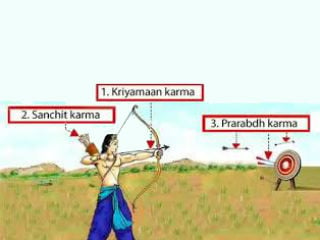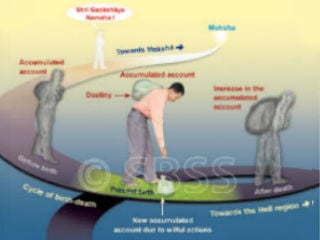All karmas performed in all the ways are through the basic components (Sattva, Raja, Tama); however, an ignorant under the spell of ego thinks that he is the doer. This ego of his is futile. During the Mahabharat battle, Arjun’s stubbornness about not participating in the battle was also karma. It was plain ego. Prakruti compels the Creation to perform karma. Karma acquires the qualities of prakruti itself. The body, mind, and intellect have originated from prakruti, so have karmas. Whoever thinks that, ‘body, mind and intellect is me’, is a fool, who considers himself to be the doer. However, an individual who has the comprehensive knowledge that, ‘I am the soul’ is a Yogi and he realises that all karmas are a play of the three components from which the mind, intellect, and indirectly even the body, are made and does not consider himself a doer. Hence, he is not entrapped in the bondage of karma.
1. Sacrificing enjoyment of karma
Sacrifice of doership of all karmas performed through the body, mind and intellect is the secret of Karmayoga. A Yogi who has sacrificed the enjoyment of karma neither owns up doership while performing different activities (for example seeing, opening and closing of eyelids, hearing, smelling, breathing, speaking, touching an object, walking, sleeping), nor considers himself to be the enjoyer of the fruits of the karma. Instead of thinking, ‘I see, I hear, I walk’, his line of thinking is ‘the eyes see, the ears hear, the feet walk’ and hence, does not get entrapped in the bondage of karma.
2. Ego reduces if karmas are
performed as per others’ wish or as obedience
An individual is generally highly egoistic about his name, status and achievements. Once he starts performing karma as per parechha (others’ wish) or in obedience, his ego begins to wane gradually. An easy way out to achieve this is to live in an Ashram; because in the Ashram, there are plenty of opportunities to behave and work as per parechha or in obedience.
3. Perform karma with a sense of duty
Karma creates merit-demerit and human beings are entrapped in the cycle of birth and death. Precautions should be taken to prevent the generation of merit-demerit while performing karma. Therefore doership, pleasure, expectations about the fruit and ego should be sacrificed and karma should be performed with a sense of duty.
4. Karma performed without
attachment results in Moksha (Final Liberation)
तस्मादसक्त: सततं कार्यं समाचर ।
असक्तो ह्याचरन्कर्म परमाप्नोति पूरुष: ।।
– Shrimadbhagwadgeeta, 3.19
Meaning: Therefore, always perform karma which are obligatory, without attachment; by performing karma without attachment, one attains to the highest (Moksha).
Explanation: Attachment to worldly objects is bondage. Detachment from worldly objects is Moksha. Performing karma by giving up attachment imparts the highest state after death. At the same time, giving up stubbornness of not performing karma or attachment is important.
‘God is devoid of ego. He is detached and without expectations, and hence, He remains unblemished. Only he who has no ego has no expectations and is unblemished. The ego of such an individual reduces gradually, and simultaneously he begins to get liberated from the bondage of karma. Then karma can no longer bind him.’ – Gurudev Dr Kateswamiji.
5. Sacrificing doership according to Dnyanyoga (Path of knowledge)
Development of happiness-sorrow as a result of karma generates attachment or hatred about performing it. Performing karma leads to the development of sanskars (Subconscious impressions). The habit of performing the same karma also leads to the development of sanskars, which in turn leads to a desire for repeating the karma, thus entangling an individual in the bondage of karma. To avoid development of sanskars, abandon both the feelings, those of doership and pleasure, and with realisation that ‘the motor organs are engrossed in karma’ watch the karma with sakshibhav (Spiritual emotion of being in an observer state).
6. Sacrifice of doership according to Bhaktiyoga (Path of devotion)
Every karma should be performed with the bhav (Spiritual emotion) of ‘ॐ तत् सत् ब्रह्मार्पणमस्तु ।’ (All karmas are surrendered unto the Holy feet of God), so it will bring happiness to both the doer and the beneficiary. God pervades entire life in this universe. Sacrificing the doership with the bhav that, He is the doer and the one who gets karma performed, an individual should face whatever sorrows come his way. Never long for another person’s wealth.
Offering sadhana (Spiritual practice) unto God means karma-samarpan. When any karma capable of bestowing Moksha is completed and offered unto Shrivishṇu, it becomes sattvik (Sattva-predominant) and successful.
A. Karma performed with bhav of surrender
and in a state of awakened bhav is full of Chaitanya
Whatever karma we perform as part of the worldly activities is in a way, Yadnya karma itself. Every object used in performing that karma is Brahman. The doer too is a form of Brahman. The karma that he performs with bhav of surrender in the fire that is Brahman form and this act performed by him is Brahman too. Thus, when a seeker performs any act with bhav of surrender, be it for the welfare and livelihood of the person, or for the welfare of society, it is Brahman. Besides, the finished product or the act is also in the form of Brahman and hence has Chaitanya. Hence, a seeker should give up attachment and physical pride, and render service for the welfare of society. After entire karma is over, the seeker should say, ‘O God ! Whatever karma has taken place through me is actually Your puja (Ritualistic worship) that has taken place through my hands. The fruit of this karma also belongs to You.
B. Offering all karmas unto God brings everlasting Anand (Bliss)
When everything in the world belongs to God, it is our ignorance that makes us think that they belong to us. If we offer all our karmas, good-bad alike, to God then, we do not have to face the consequences in the form of happiness-sorrow and we acquire everlasting Anand.
C. It is beneficial to surrender everything to God
Though we get the fruit of karma, it might not necessarily prove to be beneficial. Whatever man considers as beneficial mostly proves to be detrimental. Therefore, leave everything to God. Perform karma only for the sake of God. Then, even the fruit earned belongs to God.’ – From ‘Shrimadbhagwadgeeta, Adhyaya 3’ written by Gurudev Dr Kateswamiji
D. Have a bhav that God does everything : Meaning of a verse from Dasbodh
When you say ‘I am the doer’, it makes you unhappy. When you realise that Shriram is the doer, you are blessed and bestowed with success, fame and power.

 Using Kriyaman-karma effectively
Using Kriyaman-karma effectively Importance of Kriyaman-karma in overcoming Prarabdha-karma
Importance of Kriyaman-karma in overcoming Prarabdha-karma How to overcome sufferings of Prarabdha
How to overcome sufferings of Prarabdha Facing the consequences of Prarabdha
Facing the consequences of Prarabdha What is Sanchit-karma and Prarabdha?
What is Sanchit-karma and Prarabdha? Kartavya (Duty) karma
Kartavya (Duty) karma